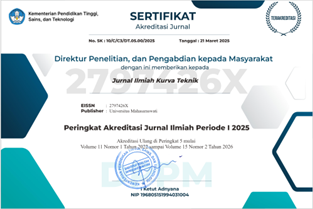ANALISIS UMUR PROYEK DENGAN METODE PROGRAM EVALUATION AND REVIEW TECHNIQUE (PERT) PADA PROYEK RENOVASI BANGUNAN MES DAN SARANA PENDUKUNG KANTOR BALAI PENGKAJIAN TEKNOLOGI PERTANIAN BALI
DOI:
https://doi.org/10.36733/jikt.v10i1.2139Keywords:
PERT Method, Microsoft ProjectAbstract
Office buildings listed into universal facilities buildings are one type of construction projects that
require a good project management to design, organize, perform and organize the construction project itself. To
achieve the success of the project needs to create a planning agenda that matches the wishes to be achieved. In
general, project scheduling makes use of waku estimates of course. But the reality in the field of various obstacles
occurred during the implementation of the project. therefore, researchers are trying to rescheduling the
implementation time of the Mess Building Renovation Project as well as supporting facilities of the Bali
Agricultural Technology Assessment Office to recognize the maximum time of completion of the project. Project
Evaluation and Review Technique (PERT) is one of the management tools in ensuring the scheduling of a project
by estimating the level of success. The pert procedure estimates 3 times is optimistic time, pessimistic time and
very maximum time. The level of accuracy estimated at the time of completion of the project is determined by the
level of accuracy estimated the duration of each activity in the project. In analyzing calculations with the PERT
method, an application-shaped tool, Microsoft Project, is used to manage projects. This application generally
makes it easier for users to create a work plan so that the implementation of the project can take place according
to the agenda, mastering the influence of possible changes that occur, which can have an effect in the process of
project implementation, financial scheduling and to unite businesses through communication and reporting of
project data. Based on the results of the research that has been done, obtained optimistic project plan age of 128
working days, the expected project plan age of 140 working days, the age of the pessimistic project plan of 153
working days, and the optimum plan age (Te) of 141 working days.











